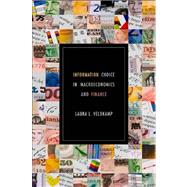Information Choice in Macroeconomics and Finance
, by Veldkamp, Laura L.- ISBN: 9780691142203 | 0691142203
- Cover: Hardcover
- Copyright: 8/22/2011
The financial crisis of 2008 has been called a crisis of information because uncertainty halted trading and triggered collapses in asset prices. Why did investors have so little information about what was happening? The study of information choice seeks to answer such questions, explaining why economic players know what they know--and how the information they have affects collective outcomes. Instead of assuming what people do or don't know and then working out economic predictions based on those assumptions, information choice asks what people would choose to know. Then it predicts what, given that information, they would choose to do. In this textbook, Laura Veldkamp introduces graduate students in economics and finance to this important new research. The book illustrates how information choice is used to answer questions in monetary economics, portfolio choice theory, business cycle theory, international finance, asset pricing, and other areas. It shows how to build and test applied theory models with information frictions. And it covers recent work on topics such as rational inattention, information markets, and strategic games with heterogeneous information. Illustrates how information choice is used to answer questions in monetary economics, portfolio choice theory, business cycle theory, international finance, asset pricing, and other areas Teaches how to build and test applied theory models with information frictions Covers recent research on topics such as rational inattention, information markets, and strategic games with heterogeneous information






